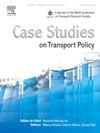Advancing sustainable urban mobility: An empirical travel time analysis of the 15-minute city model in Porto
IF 3.3
Q3 TRANSPORTATION
引用次数: 0
Abstract
The Fifteen-Minute City (FMC) concept presents a transformative approach to urban planning, prioritizing accessibility to essential services within a 15-minute walk or cycling distance. This study evaluates the feasibility and practical implications of implementing the FMC model in Porto, Portugal, bridging theoretical concepts with real-world applications. Employing a Weibull hazard-based survival model, the research draws on data from over 11,000 trips to explore the relationship between travel times and urban mobility patterns. Results show that approximately 70% of trips in Porto are completed within 15 min, indicating partial alignment with FMC principles. However, significant barriers persist, including low active mobility (AM) adoption (less than 40% of trips) due to cultural preferences for motorized transport, inadequate infrastructure, and limited public awareness of AM benefits. By identifying temporal thresholds and examining influential variables shaping modal choices, the study provides actionable insights into the challenges and opportunities of FMC implementation. The findings highlight the need for targeted interventions to shift societal attitudes and reduce reliance on private vehicles, proposing strategies such as enhancing pedestrian pathways, expanding cycling networks, and promoting mixed-use zoning. These efforts aim to foster sustainable, health-conscious urban settings, reduce traffic congestion, and improve residents’ quality of life. The study concludes by suggesting directions for future research to further explore the scalability and adaptability of the FMC model in diverse urban contexts, ultimately contributing to more accessible and sustainable urban environments.
推进可持续城市交通:波尔图15分钟城市模式的实证出行时间分析
15分钟城市(FMC)概念提出了一种革命性的城市规划方法,优先考虑在15分钟步行或骑自行车距离内获得基本服务。本研究评估了在葡萄牙波尔图实施FMC模型的可行性和实际意义,将理论概念与实际应用联系起来。该研究采用Weibull基于危险的生存模型,利用超过11,000次旅行的数据来探索旅行时间与城市交通模式之间的关系。结果表明,波尔图大约70%的行程在15分钟内完成,表明部分符合FMC原则。然而,重大的障碍仍然存在,包括由于对机动交通的文化偏好、基础设施不足以及公众对机动交通好处的认识有限,低主动机动性(AM)的采用(不到旅行的40%)。通过确定时间阈值和检查影响模式选择的变量,该研究为FMC实施的挑战和机遇提供了可操作的见解。研究结果强调了有针对性的干预措施的必要性,以改变社会态度,减少对私家车的依赖,提出了诸如加强行人通道、扩大自行车网络和促进混合用途分区等策略。这些努力旨在促进可持续的、注重健康的城市环境,减少交通拥堵,提高居民的生活质量。研究最后提出了未来研究的方向,以进一步探索FMC模型在不同城市背景下的可扩展性和适应性,最终为更接近和可持续的城市环境做出贡献。
本文章由计算机程序翻译,如有差异,请以英文原文为准。
求助全文
约1分钟内获得全文
求助全文

 求助内容:
求助内容: 应助结果提醒方式:
应助结果提醒方式:


